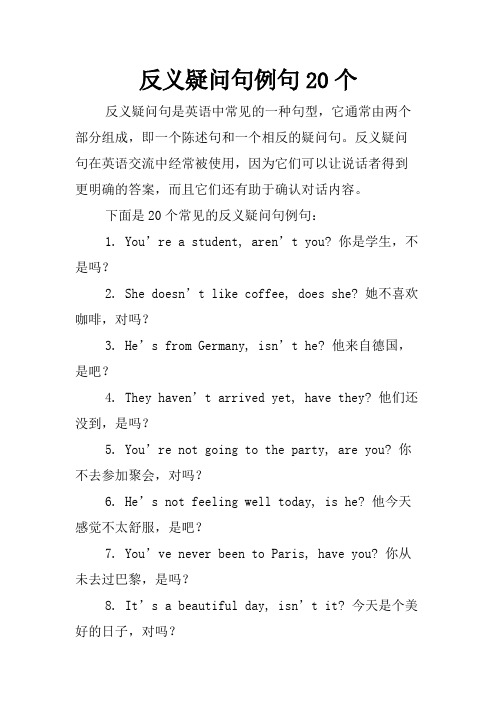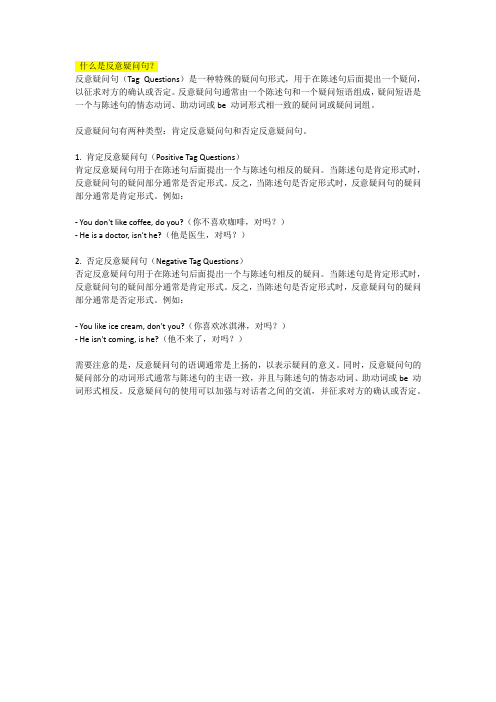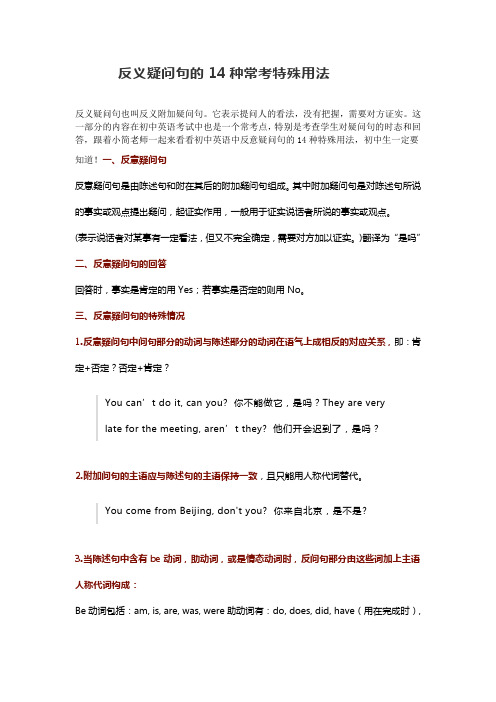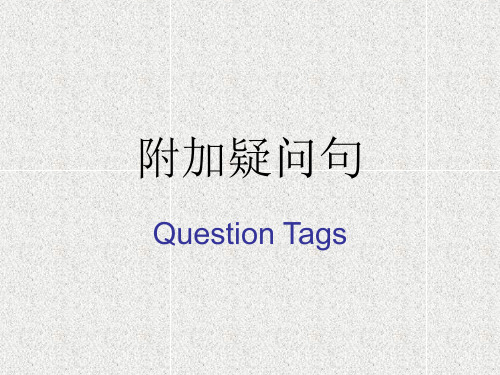反意疑问句
反义疑问句例句20个

反义疑问句例句20个反义疑问句是英语中常见的一种句型,它通常由两个部分组成,即一个陈述句和一个相反的疑问句。
反义疑问句在英语交流中经常被使用,因为它们可以让说话者得到更明确的答案,而且它们还有助于确认对话内容。
下面是20个常见的反义疑问句例句:1. You’re a student, aren’t you? 你是学生,不是吗?2. She doesn’t like coffee, does she? 她不喜欢咖啡,对吗?3. He’s from Germany, isn’t he? 他来自德国,是吧?4. They haven’t arrived yet, have they? 他们还没到,是吗?5. You’re not going to the party, are you? 你不去参加聚会,对吗?6. He’s not feeling well today, is he? 他今天感觉不太舒服,是吧?7. You’ve never been to Paris, have you? 你从未去过巴黎,是吗?8. It’s a beautiful day, isn’t it? 今天是个美好的日子,对吗?9. He can’t swim, can he? 他不会游泳,对吗?10. She doesn’t like pizza, does she? 她不喜欢披萨,对吗?11. You’re not afraid of heights, are you? 你不怕高,对吗?12. They won’t be able to attend the meeting, will they? 他们不能参加会议,对吗?13. They’re leaving tomorrow, aren’t they? 他们明天要走了,对吗?14. He’s never been skiing, has he? 他从未滑过雪,对吗?15. She’s not going to the concert, is she? 她不去音乐会,对吗?16. You’re not worried about the exam, are you? 你不担心考试吧,对吗?17. He didn’t eat breakfast this morning, did he? 他今天早上没吃早餐,对吗?18. They’r e not going to the beach, are they? 他们不去海边,对吗?19. You’ve already seen the movie, haven’t you? 你已经看过这部电影了,对吗?20. He’s not coming to the party, is he? 他不来参加聚会,对吗?在使用反义疑问句时,需要注意的是,它们并不总是表示对话者的不确定或疑虑。
什么是反意疑问句

什么是反意疑问句?反意疑问句(Tag Questions)是一种特殊的疑问句形式,用于在陈述句后面提出一个疑问,以征求对方的确认或否定。
反意疑问句通常由一个陈述句和一个疑问短语组成,疑问短语是一个与陈述句的情态动词、助动词或be 动词形式相一致的疑问词或疑问词组。
反意疑问句有两种类型:肯定反意疑问句和否定反意疑问句。
1. 肯定反意疑问句(Positive Tag Questions)肯定反意疑问句用于在陈述句后面提出一个与陈述句相反的疑问。
当陈述句是肯定形式时,反意疑问句的疑问部分通常是否定形式。
反之,当陈述句是否定形式时,反意疑问句的疑问部分通常是肯定形式。
例如:- You don't like coffee, do you?(你不喜欢咖啡,对吗?)- He is a doctor, isn't he?(他是医生,对吗?)2. 否定反意疑问句(Negative Tag Questions)否定反意疑问句用于在陈述句后面提出一个与陈述句相反的疑问。
当陈述句是肯定形式时,反意疑问句的疑问部分通常是肯定形式。
反之,当陈述句是否定形式时,反意疑问句的疑问部分通常是否定形式。
例如:- You like ice cream, don't you?(你喜欢冰淇淋,对吗?)- He isn't coming, is he?(他不来了,对吗?)需要注意的是,反意疑问句的语调通常是上扬的,以表示疑问的意义。
同时,反意疑问句的疑问部分的动词形式通常与陈述句的主语一致,并且与陈述句的情态动词、助动词或be 动词形式相反。
反意疑问句的使用可以加强与对话者之间的交流,并征求对方的确认或否定。
18种特殊反义疑问句

初中英语18种特殊的反意疑问句1.祈使句。
祈使句后一般加上will you或won't you构成反意疑问句,用will you 多表示“请求”,用won't you 多表示提醒对方注意。
例如:Look at the blackboard, will you/ won't you?看黑板,好吗?Let引导的祈使句有两种情况:1)Let's...,后的反意疑问句用shall we或shan't we。
例如:Let's go home, shall we/ shan't we? 回家吧,好吗?还可以用may I来表示征求对方的同意或许可。
2)Let us/me...后的反意疑问句用will you或won't you。
例如:Let me have a try, will you/won't you? 让我试一试,行吗?2.感叹句。
感叹句后加反意疑问句时,其反意疑问句需用be的一般现在时态的否定形式。
例如:What fine weather, isn't it? 多好的天气啊,是吧?3. 当陈述部分谓语动词是need, dare, used to,且这些词被用作实义动词时,其反意疑问句需用do的适当形式。
例如:He needs help, doesn't he?他需要帮助,是吗?4.陈述部分主、谓语是I am...时,反意疑问句用aren't I 或ain't I ,而不是am not I (可用am I not)。
例如:I'm working now, ain't I? 我在工作,是吗?5.陈述部分的主语是everything, nothing, anything或something 时,反意疑问句的主语应用代词it。
例如:Something is wrong with my radio, isn't it? 我的收音机出毛病了,是吧?6.陈述部分的主语是everybody, everyone, anybody, anyone, somebody, someone, nobody, no one, none, neither 时, 其反意疑问句的主语需用复数代词they。
反义疑问句的14种常考特殊用法

反义疑问句的14种常考特殊用法反义疑问句也叫反义附加疑问句。
它表示提问人的看法,没有把握,需要对方证实。
这一部分的内容在初中英语考试中也是一个常考点,特别是考查学生对疑问句的时态和回答,跟着小简老师一起来看看初中英语中反意疑问句的14种特殊用法,初中生一定要知道!一、反意疑问句反意疑问句是由陈述句和附在其后的附加疑问句组成。
其中附加疑问句是对陈述句所说的事实或观点提出疑问,起证实作用,一般用于证实说话者所说的事实或观点。
(表示说话者对某事有一定看法,但又不完全确定,需要对方加以证实。
)翻译为“是吗”二、反意疑问句的回答回答时,事实是肯定的用Yes;若事实是否定的则用No。
三、反意疑问句的特殊情况1.反意疑问句中问句部分的动词与陈述部分的动词在语气上成相反的对应关系,即:肯定+否定?否定+肯定?You can’t do it, can you? 你不能做它,是吗?They are verylate for the meeting, aren’t they? 他们开会迟到了,是吗?2.附加问句的主语应与陈述句的主语保持一致,且只能用人称代词替代。
You come from Beijing, don't you? 你来自北京,是不是?3.当陈述句中含有be动词,助动词,或是情态动词时,反问句部分由这些词加上主语人称代词构成:Be动词包括:am, is, are, was, were助动词有:do, does, did, have(用在完成时),has(用在完成时)等情态动词有:can, could, may, might, must, will, would, shall, shouldHe will go home, won’t he? 他要回家了,是吗?She doesn’tlike to eat popcorn, does she? 她不喜欢吃爆米花,是吗?4.have的不同用法,反义疑问句用不同的动词(1)have 表“有”时,反义疑问句谓语动词用have/do都行He has a new car, doesn’t/hasn’t he?(2)have表“吃,喝,玩,度过,举办”等是,反义疑问句谓语动词用doHe has supper at home every day, doesn’t he?They had agood time in Beijing, didn’t they?(3)have to表“不得不,必须”时,反义疑问句谓语动词用doKite has to help her mother, doesn’t she?(4)had better表“最好”时,反义疑问句谓语动词用hadWe had better go to school at once, hadn't we?(5)have用在完成时中,反义疑问句谓语动词用haveThey have known the matter, haven’t they?5.(1)反意疑问句的陈述部分带有little, few, never, hardly, seldom,nobody, nothing, no one, none, neither等否定意义的词时,问句部分用肯定式。
反义疑问句

conversation n.交谈;谈话hold/have a conversation with 和……谈话Children quickly get bored by adult conversation.aloud adv.大声的;出生地aloud是相对于默读而言,声音不一定很大。
常与read,say等动词连用。
loudly表示有目的的提高音量以便让人听见。
常指声音高且喧闹、不悦耳等patient adj.有耐心的n.病人be patient with/to 对……有耐心be patient of sth忍耐某事Are you patient enough to teach me how to send email?discover v.发现;发觉dis(否定前缀)+cover(覆盖)发现We discover this beach while we were sailing around the island.secret n.秘密;秘诀adj.秘密的;保密的通常用作单数名词,其前加定冠词the。
keep a secret 保密the secret to ……的秘诀in secret 秘密地,暗地里let out a secret泄露机密tell sb a secret 告诉某人一个秘密Your secret is safe with me.look up(再词典、参考书中或通过电脑)查阅;抬头看We I called him,he looked up from his paper he was writing.I look up the word in several dictionaries.repeat v.重复;重做repeat本身已包含“重、又、再”的含义,故不可与“again”连用。
Please repeat what I’ve just told you.increase v.增加;增长increase by 增加了increase to 增加到Try to increase thenumber of your words.they’ve increased the price by 50﹪.speed n.速度at the speed of 以……的速度with all speed 以全速Extreme care is always needed when flying at high speed.born v.出生adj.天生的be born with 天生具有be born in 出生于Her borther was born with blind.connect v.(使)连接;与……有联系connect with 把……和……连接起来connect to 把……连接到……Connect the speakers to the CD players.knowledge n.知识;学问knowledge是不可数名词,但有时可加不定冠词,意为“对……有某种程度的了解”;knowledge 不能做learn的宾语,只能说get some knowledge。
反义疑问句知识点

反义疑问句反义疑问句:在陈述句后附加一个简短的疑问句,可以表示疑问,也可以表示说话者的某种倾向,强调或反问。
反义疑问句通常由两个词组成:第一个词是be、情态动词、助动词;若为否定,not用简略形式。
第二个词是人称代词主格(与陈述句主语相同)。
例:……,can't we? 和……,can we?⑴一般情况下:前面陈述句是肯定句,后面反义疑问句部分用否定;即“前肯定后否定,前否定后肯定”。
⑵当陈述句部分有表示否定或部分否定意义的词如little,barely,hardly,rarely,scarcely,seldom,few,no,never,nothing,not等词时,反意疑问句部分要用肯定形式。
You can hardly blame Tom for leaving early, can you?你不能责怪汤姆提前离开,是吗?当陈述句部分中表示否定意义的词为含有im-,in-,dis-,un-等否定前缀或-less等否定后缀的词时,应把陈述句部分视为肯定句,反意疑问句部分要用否定形式。
(有否定意义,但不能算否定词)Tom dislikes the book,doesn't he? 汤姆不喜欢这本书,是吗?⑶陈述句主语不同情况①当陈述句部分的主语是everyone,someone,anyone,no one,everybody,somebody,anybody,nobody等表示人的不定代词时,反意疑问句部分的主语通常用he,但口语多用they;Nobody wants to go here,does he/do they?没有人想去那里,是不是?②当陈述句部分的主语是anything,everything,nothing,something 等表示物的不定代词时,反意疑问句部分的主语常用it.Everying seems all right now,doesn't it?似乎一切顺利,是不是?②当陈述句部分的主语是I 时,反意疑问句部分的主语常用aren't I.若表示征询对方意见时,疑问句部分用do you.I am healthy,aren't I?我很健康,对吗?I don't like this film,do you?我不喜欢这部电影,你呢?④当陈述句部分的主语是不定式(短语)或动名词(短语)时,反意疑问句部分的主语常用it.Learning English well takes a long time,doesn't it?学好英语需要好长时间,是不是?②当陈述部分的主语是指示代词this /that或these /those时,疑问句中的主语分别用it或theyThis is important, isn't it? 此事很重要,是不是?②如果陈述部分是以代词one作主语疑问句的主语,在正式场合用one 非正式场合用you在美国英语中非正式场合下,还可以用heOne cannot be too careful, can one /can you? 越仔细越好,对不对?②陈述部分有neither…nor 或both …and连接两个主语时,疑问句部分的主语常用复数形式。
反意疑问句

20) 当 have 为实意动词时要分两种情况: (1)若表示“所有”,反意疑问句可以用have,也可以 用do: eg: He has a lot of friends here, hasn’t / doesn’t he? 但是若陈述部分用的是have的否定式,反意疑问句用 have 还是用do,取决于陈述部分的动词形式: eg: He hasn’t any money, has he? He doesn’t have any money, does he? (2) 若表示“吃”、“玩”等其它意思,反意疑问句要 用助动词do: eg: He has supper at 5, doesn’t he? eg: He had a good time at the party, didn’t he?
4) 含有ought to 的反意疑问句,陈述部分是肯定的,疑问部 分用shouldn't / oughtn't +主语。 eg: He ought to know what to do, oughtn't he? / shouldn't he? 5) 陈述部分的谓语是used to 时,疑问部分用didn't +主语或 usedn't +主语。 eg: He used to take pictures there, didn't he? / usedn't he? 6) 陈述部分有would rather +v.,疑问部分多用 wouldn't +主 语。 eg: He would rather read it ten times than recite it, wouldn't he?
反义疑问句(最全)

5.陈述部分有would rather +v.,疑问部分多用 wouldn’t +主语。 He would rather read it ten times than recite it, wouldn’t he? 6.陈述部分有you’d like to +v. 疑问部分用wouldn’t + 主语。 You’d like to go with me, wouldn’t you? 7.陈述部分是“there be”结构时,疑问部分用there省 略主语代词。 There is something wrong with your watch, isn't there? There will not be any trouble, will there? Note: 当为“ there used to be…”句型时,反意问句用 didn’t there。
b. 带有定语从句,宾语从句的主从复合句,疑问部分谓 语根据主句的谓语而定 He is not the man who gave us a talk, is he? He said he wanted to visit Japan, didn’t he?
c. 上述部分主句是由谓语think, believe, expect, suppose, imagine等引导的宾语从句,疑问部分与宾语 从句相对应构成bright, is he? We believe she can do it better, can't she? Note: 但此时主语必须是第一人称。如果不是,则不能否定从 句。 He thought she was wrong, didn't he? 而不能说wasn't she?
a 表示肯定推测 (一)句中陈述部分没有表示过去的时间状语,这时疑问 部分中的动词就用现在完成时。 (haven’t / hasn’t + 主语) You must have told her about it, haven’t you?
- 1、下载文档前请自行甄别文档内容的完整性,平台不提供额外的编辑、内容补充、找答案等附加服务。
- 2、"仅部分预览"的文档,不可在线预览部分如存在完整性等问题,可反馈申请退款(可完整预览的文档不适用该条件!)。
- 3、如文档侵犯您的权益,请联系客服反馈,我们会尽快为您处理(人工客服工作时间:9:00-18:30)。
课前检测一、单词默写1. 处理琐事2. 取出垃圾3. 洗衣服4. 从事,忙于5. 整理床铺6. 借入;借出7. 扫地8. 感谢您的邀请9. 舒适的座位10. 友好的服务11. 积极的12. 时髦的13. 消极的14. 特价商品15. 乏味的,无聊的16. 成功的表演17. 才艺表演18. 长距离,长路程19. 还,仍然20. 最远的21. 南方的省22. 禁止23. 下(蛋)24. 一点也不25. 若没有你的帮助,我就不可能做完了。
知识梳理反意疑问句:一、定义:当我们陈述了一个事实,而又不是很有把握,就可以在陈述句后加一个简短问句,称为反意疑问句。
例:She is a student, isn’t she?We speak Chinese, don’t we?二、结构结构一:前肯,+ 后否例:She is a student, isn’t she?结构二:前否,+ 后肯例:She isn’t a student, is she?三、解答步骤1. 判定(判断该用肯定还是否定);2. 找动(找句子的助动词:be用be,动词原形do,三单does,过去did,完成have);3. 换代(将主语换为代词);Jack wasn’t playing soccer, ____ _____?Their parents have gone to London, ________ _____?I have never been to the park, ______ ____?四、几个类型句子1. be动词(is, are, was, were)的句型现在时态:主语+is (are)…, isn’t (aren’t) + 主语?过去时态:主语+was (were)…, wasn’t (weren’t) + 主语?1 He is your uncle, ____________?2 You are not students, ____________?3 The students are going to have a picnic, _____________?2. 一般动词(play, study, watch 等)句型现在时态:主语+play/plays…, don’t (doesn’t) + 主语?过去时态:主语+played…, didn’t + 主语?1 Your mother likes cooking _____________?2 He has an apple, ______________?3 The plane took off an hour ago, ___________?3. 情态动词(can, will)的反意疑问句主语+can/will …, can’t /won’t + 主语?1 Tom can swim very well, __________?2 Your parents can’t swim, ____________?4. There be 句型的反意疑问句There is/are/will be…, isn’t/aren’t/won’t there?1 There is a pen on the chair,___________?2 There are 60 students in our class, _____________?5. 当陈述部分有never,seldom(很少), hardly(几乎不),few,little,nothing(没有) 等否定意义的词时,后面的反意疑问句则为肯定形式1.They have never visited his home, ___ ____ ?2.There are few apples in the basket,___ ____?3.He can hardly swim,____ _____?4.They seldom很少come late,_____ _____?6. 祈使句的反意疑问句祈使句, will you?1 Don’t be late, _____ ______?2 Have a rest, _____ ______?7. Let’s的反意疑问句shall weLet’s have a rest, _____________? (包括听话者)Let us have a rest, _____________? (不包括听话者)8. 完成时的反义疑问句主语+have/has+过去分词…, haven’t (hasn’t) + 主语?1 You have heard of him, ______________?2 He has been to America, ______________?3 Marry hasn’t lived in the countryside, ______________?4 You haven’t been to Shang hai, __________?5 They have never been to Hong Kong, ______________?五、反义疑问句特殊情况1. everyone, no one, everybody, somebody, anybody, nobody, anyone, someone, none, neither等疑问句部分中主语一般用they, 也可用he例:Everyone is in the classroom, aren’t they?Somebody wants to see you, doesn’t he/ don’t they?No one knows about it, do they?2. everything, anything, something, nothing等疑问句部分中主语一般用it代替,而不用they例:Something is wrong with your computer, isn’t it?3. this/that疑问句中相应主语用it; these/those主语用they例:This is a beautiful picture, isn’t it?Those aren’t apple trees, are they?4. 有否定前缀的派生词仍看成肯定处理。
否定前缀有:un-, dis-, in-, -less, etc.例:It is unfair, isn’t it?5. 由think, believe, suppose, imagine, expect等引导从句,其反义疑问句分二种情况1) 当主句主语是第一人称时,则应与从句相一致例:I expect our English teacher will be back this weekend, won’t he/she?I don’t expect our English teacher will be back this weekend, will he/she?2) 当主句的主语为第二、第三人称时,则应与主句相一致(否定只看主句部分,不管从句)例:She believed he would come tomorrow, didn’t she?6. had better的疑问句的谓语动词为had例:we had better stop talking, hadn’t we?7. 祈使句中,let’s开头的附加问句应用shall we; 而以let us开头的问句用will you例:let’s go to the park, shall we?Let us help you, will you?8. 陈述部分是there be结构,疑问句用be there例:There was a hospital here, wasn’t there?9. 当陈述部分含有must时,分以下几种情况1) mustn’t表“禁止”,疑问部分谓语用must例:You mustn’t stop your car here, must you?2) must表“必须”之一,问句谓语用needn’t例:They must come on time, needn’t they?3) must表推测时,意为“一定,想必”,疑问句部分谓语根据must后面的动词例:That man must be Mr. Wang, isn’t he?4) 陈述部分有must have done时若有明确过去时间,疑问部分谓语用didn’t:She must have read the novel last week, didn’t she?若没有明确过去时间,疑问部分用haven’t:She must have told her about it, haven’t she?10. 陈述部分有ought to,疑问部分为shouldn’t/ oughtn’t + 主语例:He ought to know what to do, oughtn’t he / shouldn’t he?11. 陈述部分有used to,疑问部分为didn’t/ usedn’t + 主语例:He used to take pictures there, didn’t he / usedn’t he?12. 陈述部分有would rather/like,疑问部分为wouldn’t + 主语例:He would rather read it ten times than recite it, wouldn’t he?You would like to go with me, wouldn’t you?13. 陈述部分有need/dare时,如果need/dare用作实义动词,则疑问句中用do;如果need/dare用作情态动词,则疑问句中用need/dare例:we need to arrive in Shanghai at 7:00, don’t we?We needn’t leave at once, need we?You daren’t go there, dare you?14. 感叹句的反义疑问句为be动词的否定式例:Wat fine weather, isn’t it?15. 陈述部分有I am,疑问句用aren’t I/ ain’t I?例:I’m working now, ain’t I?16. 当陈述部分主语是one时, 疑问部分主语可以用one, 或you/he.例:One should be ready to help others, shouldn’t one?17. 主语是从句、不定式、动名词形式时,疑问句部分主语用it例:What you need is more important, isn’t it?18. 陈述部分由I wish开头,疑问句用may I例:I wish to go with them, may I?19. 主从句或并列复合句1) 并列复合句疑问句中谓语动词根据邻近从句的谓语而定例:Mr. Smith had been to Beijing for several times, he should have been in China now, shouldn’t he?2) 主从句,疑问句中谓语动词根据主句的谓语而定例:he is not the man who gave us a talk, is he?20. 陈述部分用neither…nor, not only…but also等连接主语时,疑问部分主语用复数例:neither you nor I can do it, can we?Not only she but also I passed the exam, didn’t we?反义疑问句的回答:只根据事实情况进行回答。
